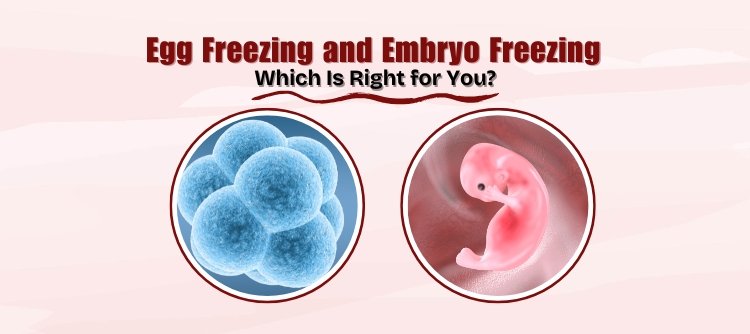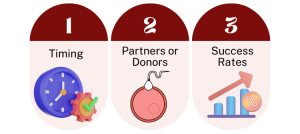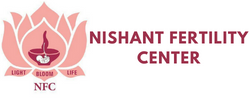Egg Freezing and Embryo Freezing: Which Is Right for You?

Various advanced options are available for individuals and couples who want to preserve their ability to conceive in the future. Two popular choices include egg freezing and embryo freezing. While both methods are designed to preserve fertility, they cater to different needs and circumstances. Understanding their distinctions and suitability is crucial in making the right decision.
What is Egg Freezing?
Egg freezing, or oocyte cryopreservation, involves extracting a woman’s eggs and freezing them for future use. These eggs remain unfertilized and can be thawed and fertilized later using sperm to create embryos. This option is often ideal for:
1. women who want to put off having children for work or personal reasons.
2. Individuals diagnosed with medical conditions like cancer who need treatments that could affect their fertility.
3. Those who may face a premature decline in ovarian reserve.
Egg freezing allows individuals to have biological children later in life when natural conception might be challenging.
What is Embryo Freezing?
Embryo freezing involves fertilizing eggs with sperm to create embryos, which are then frozen for future implantation. This method is often chosen by:
1. Couples undergoing in-vitro fertilization (IVF) who want to preserve additional embryos for future use.
2. Individuals who have already decided on a sperm donor.
3. Women or couples who feel more secure preserving embryos rather than eggs.
Embryo freezing is a more developed process than egg freezing because embryos can survive the freezing and thawing process more reliably.
Key Differences Between Egg and Embryo Freezing
1. Timing: Egg freezing offers flexibility to fertilize later, while embryo freezing requires fertilization at the time of retrieval.
2. Partners or Donors: Egg freezing does not require immediate decisions about sperm sources, making it a good choice for single women. Embryo freezing, however, requires sperm from a partner or donor upfront.
3. Success Rates: Embryos generally have higher survival rates post-thaw and result in higher pregnancy success rates compared to eggs.

Factors to Consider When Choosing Between Egg and Embryo Freezing
1. Current Life Situation: Single individuals might prefer egg freezing, while couples ready for parenthood may opt for embryos.
2. Future Plans: Consider the flexibility of fertilizing eggs later versus committing to embryos now.
3. Medical Recommendations: Consult with a fertility specialist to determine which option aligns with your health and goals.
Conclusion
Preserving fertility empowers individuals and couples to take control of their reproductive futures. Whether egg freezing or embryo freezing is the right choice depends on your current and future goals. By understanding the differences and considering expert guidance, you can make an informed decision that aligns with your aspirations.
For expert guidance and state-of-the-art services, consult the team at Nishant Fertility Centre, a trusted IVF hospital in Jaipur specializing in comprehensive fertility care. Taking the first step towards planning your family’s future has never been easier!
